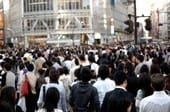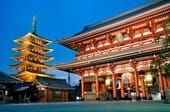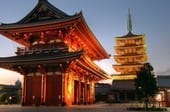TEFL Certification Tokyo | TEFL Japan
Tokyo is the venue for the tefl international course in japan. An incredible city on the edge of the Orient, Tokyo is the last great conurbation before the Pacific Ocean, and is one of the world's most fascinating cities.
Take a step back from the big city bustle and the frenetic main roads and you'll find yourself in a world of tranquil backstreets, where wooden houses are fronted by neatly clipped bonsai trees; wander beyond the high-tech department stores, and you'll find ancient temples and shrines. In this city of 24-hour shops and vending machines, a festival is held virtually every day of the year, with the locals regularly visiting their local shrine or temple and scrupulously observing the passing seasons. At the centre of it all is the mysterious green void of the Imperial Palace, home to the emperor and a tangible link to the past.
In so many ways Tokyo is something of a modern-day utopia. Trains run on time; the crime rate is virtually non existent; shops and vending machines provide everything you could need (along with many things you never thought you needed) 24 hours a day. The people simply have to wear the coolest fashions, eat in fabulous restaurants and party in the hippest clubs. It's almost impossible to be bored here and first-time visitors should be prepared for a major assault on the senses; just walking the streets of this hyperactive city can be an energizing experience.
TEFL course participants will also be pleasantly surprised how affordable many things are. Cheap-and-cheerful izakaya (bars that serve food) and noodle shacks far outnumber the big-ticket French restaurants and high-class ryotei, where geisha serve minimalist Japanese cuisine. Day tickets for a traditional sumo tournament or a Kabuki play can be bought for the price of a few drinks.
Many of the city's highlights are even free: Stroll through the evocative Shitamachi (low city) area around Asakusa and the major Buddhist temple Senso-ji. Pay a visit to the tranquil wooded grounds of Meiji-jingu, the city's most venerable Shinto shrine, and the nearby teenage shopping mecca of Harajuku. Experience the frenetic fish market at Tsukiji. Soak up the neon-saturated atmosphere of the mini-city Shinjuku.Either before or after your TEFL course you may want to explore other parts of Japan. Tokyo is the major transport hub for Japan. Every day, scores of Shinkansen (bullet trains) speed up to the far north of Honsho or south to Kyushu, while flights, buses and ferries connect Tokyo to the far-flung corners and islands of the Japanese archipelago.
Tokyo can be fairly warm in the height of summer, when visitors enjoy the plentiful air-conditioning. October and November, by contrast, are great months to take in the spectacularly coloured autumn leaves in Tokyo's parks and gardens. Temperatures dip to freezing in the winter months, though the crisp blue skies are rarely interrupted by rain or snow showers. April is the month when locals party beneath the flurries of falling cherry blossoms – perhaps one of the most picturesque months to visit Tokyo. Carrying an umbrella is a good idea during the rainy season in June and September, when typhoons occasionally strike the coast.
Legend has it that a giant catfish sleeps beneath Tokyo Bay, and its movements can be felt in the hundreds of small, harmless tremors that rumble the capital each year. There is a long-running, half-hearted debate about moving the Diet and main government offices out of Tokyo, away from danger. Yet, despite the fact that the city is well overdue for the Big One, talk of relocating the capital always comes to nothing. Now, more than ever before, Tokyo is the centre of Japan, and nobody wants to leave and miss any of the action.
Tokyo is the place to be – an ideal location for your TEFL course.
Register now & get certified to teach english abroad!The School
The TEFL International training centre in Tokyo is a 15 minute walk from JR Kanamachi Station or Keisei Kanamachi Station. Buses are also available from the north side of the station (JR); take the “Togasaki Soushajyou iki” Keisei bus or the “Obagawa Suimon iki” Keisei bus to “Mizumoto Koen Mae”; from the south side (Keisei) take the “Togasaki Soushajyou iki” Keisei bus to “Mizumoto Koen Mae”.
Subway transportation to every part of Tokyo is close to the TEFL training center building; the Tokyo Station will whisk you away to the glitz and glamour of the Ginza Strip, or to the wonders and silence of the world-famed Shinto Pagoda.
On weekends you can take the famed Bullet Train out of the city and into the quiet dignity of the Japanese countryside in less than two hours. When your spirit is refreshed you can head back to the where the action is – TEFL International, Tokyo!>
Accommodation
There are a number of accommodation options available to you during your TEFL course in Tokyo. The Tokyo TEFL training centre staff are able to help applicants arrange housing for the duration of the TEFL course, although you are free to make your own arrangements if you would prefer.
Your Tokyo accommodation options include:
- Guest House: 42,000 - 120,000 yen per month.
- Shared Room: 39,000 yen per month. This is based on two or three trainees sharing a guest house room. Male/Female rooms divided.
- Dormitory: 37,000 yen per month, based on four or more people sharing a large room. Again, male and female rooms are divided.
Course dates
2025
- 1 September 2025 - 26 September
- 6 October 2025 - 31 October
- 3 November 2025 - 28 November
2026
- 5 January 2026 - 30 January
- 2 February 2026 - 27 February
- 2 March 2026 - 27 March
- 6 April 2026 - 1 May
- 11 May 2026 - 5 June
- 8 June 2026 - 3 July
- 6 July 2026 - 31 July
- 7 September 2026 - 2 October
- 5 October 2026 - 30 October
- 2 November 2026 - 27 November
Course fees
The total price is divided into: deposit and balance.
The deposit may be paid via a) credit card b) Paypal c) wire transfer d) Western Union.
The balance of the course fee must be paid by cash, PayPal or bank transfer directly to the training center on the first day of the course.
US$ 400
US$ 1790
Accomodation Fees
The accommodation fees are not part of the course price and you are free to choose whichever accommodation option you prefer.
If you choose to use our accommodation, it should be paid for in cash directly to the school at the start of the course.
JPY 70000
special price on offer from









